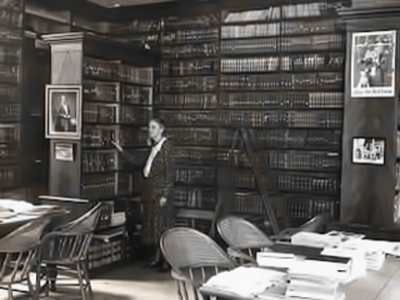Thomas Hughes Free Public Library is virtually unchanged since it opened in 1882. With 7,000 original volumes, it is still overseen by former librarian Eduard Bertz, a German perfectionist. It is said that his spirit is most likely to be sensed at twilight.
History:
Thomas Hughes was born on October 22, 1822, in Uffington, Berkshire, England. As the second of John and Margaret Wilkinson Hughes’ seven sons, Hughes was afforded the childhood of one of England’s elite, attending the Rugby School, a well-known British public school, and, later, Oriel College, Oxford, where he excelled in sports more than in academics but received his B.A. in 1845.
Hughes read law at Lincoln’s Inn and the Inner Temple of London, roughly the British equivalent of American law schools, and was called to the Bar in 1847, the same year he married Francis (Fanny) Ford. He was also twice elected a member of Parliament and achieved designation as a Queen’s Councilor.
Hughes became interested in Christian Socialism early in life and used its influence to co-found the London Working Men’s College as well as some of England’s first trade unions, but perhaps Hughes is best known for his literary efforts, publishing Tom Brown’s Schooldays in 1857. He followed with a sequel, Tom Brown at Oxford, although it was never as successful as the original. Other books by Hughes include religious works, such as A Layman’s Faith; a novel based on local color, The Scouring of the White Horse; and several biographies of famous Victorian men, such as David Livingstone. In 1881, Hughes wrote Rugby, Tennessee: Being Some Account of the Settlement Founded on the Cumberland Plateau.
In Hughes’ day, the British custom of primogeniture was still quite prevalent, which meant the eldest son usually inherited the bulk of any estate and/or property while the younger sons either had to marry well or seek employment in one of the few professions considered socially acceptable.
However, Britain experienced a great recession in the 1870s, and graduates of prestigious public schools such as Eton, Westminster, and Rugby found it extremely difficult to find positions in law, medicine, or the clergy. Hughes toured America in the early 1870s on a speaking tour promoting healing the rift left after the American Civil War, and he returned to Britain, declaring the country to be a land of great opportunity. He felt it would be both helpful and profitable for the younger sons of the English gentry to travel to the American frontier and work with their hands in agricultural pursuits rather than “starve like gentlemen” in the British Isles.
Thomas Hughes dedicated the Rugby Colony on October 5, 1880, amid great fanfare. He envisioned a utopian community where the younger sons of Britain could build a strong, agricultural community through cooperative enterprise while maintaining a cultured, Christian lifestyle free of the rigid class distinctions that prevailed in their homeland.
Rugby attracted attention on two continents, being a darling of both the American and European press, and by 1884, it was a thriving community with over 300 residents and some 70 graceful Victorian buildings. While the land may have been rustic, the community was refined, and literary societies and drama clubs were soon established. Lawn tennis courts were laid out and used quite frequently, while both residents and visitors also enjoyed rugby football, horseback riding, croquet, and swimming in the clear, flowing waters of the area.
Two trains a day ran between Rugby and Cincinnati, providing goods, services, entertainment, and visitors who frequently lodged at the grand Tabard Inn, named for Chaucer’s Canterbury Tales. Rugby was home to a weekly newspaper, general stores, stables, sawmills, and boarding houses, while a drug store, dairy, and butcher shop were all open for business. The Thomas Hughes Public Library opened in 1882 with thousands of volumes donated by admirers and publishers and quickly became the pride of the colony.
However, all was not well. A typhoid epidemic in 1881 claimed the lives of seven residents and was widely reported in the press, while financial problems plagued the colony. Hughes poured more than $75,000 of his own money into the venture, moving his elderly mother, brother Hastings, and niece Emily there, but he was only able to spend a month or so of each year there himself, and that wasn’t enough to keep the community thriving. By 1900, most of the original colonists had gone, many moving to other parts of America.
The remaining colonists raised families and struggled to keep the rugby dream alive. In 1966, area residents formed Historic Rugby, a non-profit organization charged with restoring and preserving the Utopian community’s remaining buildings and landscape. Historic Rugby was listed as a district on the National Register of Historic Places in 1972 and continues to pursue National Landmark status while offering daily tours, workshops, and educational programs with various events that take place year-round. More than 65,000 visitors from all 50 states and several foreign countries make the pilgrimage to Historic Rugby annually and are welcomed by the area’s 85 residents.
Today, there are 20 of the original Victorian buildings standing, with privately owned historic homes being restored by their owners. Other buildings have been reconstructed, and future plans include restoring the 1881 Uffington House, home of the founder’s mother and niece, and reconstructing both the Alexander/Perrigo Boarding House and the three-story Tabard Inn, complete with its wide verandahs, billiard room, Victorian-furnished bedrooms, and dining room. New residents will be moving into the area soon as design-controlled homes are built by modern colonists in Beacon Hill, an area designated on the 1880 town plan for residences.
Location: State Highway 53, Rugby

